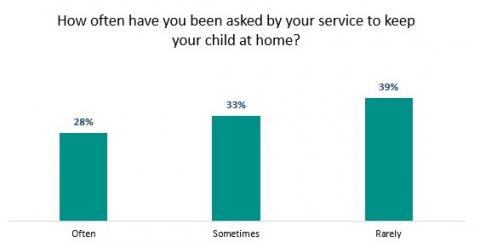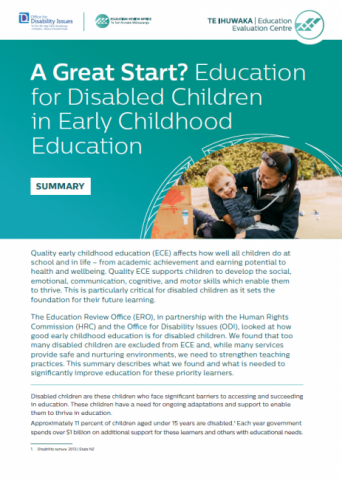Summary
Quality early childhood education (ECE) affects how well all children do at school and in life – from academic achievement and earning potential to health and wellbeing. Quality ECE supports children to develop the social, emotional, communication, cognitive, and motor skills which enable them to thrive. This is particularly critical for disabled children as it sets the foundation for their future learning.
The Education Review Office (ERO), in partnership with the Human Rights Commission (HRC) and the Office for Disability Issues (ODI), looked at how good early childhood education is for disabled children. We found that too many disabled children are excluded from ECE and, while many services provide safe and nurturing environments, we need to strengthen teaching practices. This summary describes what we found and what is needed to significantly improve education for these priority learners.
Whole article:
A Great Start? Education for Disabled Children in Early Childhood Education - summaryIntroduction
Disabled children are these children who face significant barriers to accessing and succeeding in education. These children have a need for ongoing adaptations and support to enable them to thrive in education.
Approximately 11 percent of children aged under 15 years are disabled.[1] Each year government spends over $1 billion on additional support for these learners and others with educational needs.
What does good education look like for these children?
Participation in quality ECE impacts education and wellbeing outcomes, and life outcomes later, particularly for children who experience additional challenges. Research shows that the earlier and longer the participation in ECE, the greater the impact. To thrive, disabled children need to be able to enrol and fully participate in all aspects of early childhood education, and curriculum, teaching, and physical environments need to be adapted to meet their needs. Like all learners, disabled children need to receive quality teaching, in supportive environments, and with strong partnerships with their whānau.
How well are disabled children doing?
Disabled children enjoy ECE, feel safe, and that they belong. We found disabled children are participating, and enjoy ECE.
- Almost all parents and whānau (91 percent) of disabled children reported their child enjoys attending ECE.
- More than four in five parents and whānau believe their child feels loved, cared for, and comfortable.
- Four in five parents and whānau agree their child has a sense of belonging at their service.
“She's [a] happier child for the early learning.” (Parent – ECE)
Disabled children are being excluded from enrolling and fully participating. We found a significant number of parents and whānau are being discouraged from enrolling their disabled child, and are asked to keep their disabled child home for specific activities.
- A quarter of parents and whānau have been discouraged from enrolling their disabled child at one or more services.
- Almost one in five parents and whānau have been asked to keep their disabled child at home. Of these parents, over a quarter have been asked often (see Figure 1).
- Over a third of kaiako (ECE teachers) are either not confident or are only somewhat confident about including disabled children in outings.
“As soon as I open up and tell them, they’re like, ‘oh sorry actually we don’t have space’, or, ‘oh sorry uh I don’t think we can manage him, you’ll have to find somewhere else’, or, ‘I don’t think this place is right for him’.” (Parent - ECE)

We do not know how well disabled children are progressing. We found many services lack information showing how well disabled children are progressing, and do not communicate children’s next steps with their parents and whānau.
- Over half of parents and whānau said kaiako never or only sometimes discuss their child’s next steps in their learning goals with them.
- In observations, we found that assessments often focus on what children are doing rather than what they are learning.
Children with complex needs are doing less well. Children with complex needs experience exclusion more than their disabled peers with less complex needs. Kaiako are less likely to discuss children’s learning with parents and whānau, and parents and whānau are less likely to report their child feels safe and that they belong.
- Over one third of parents and whānau of children with complex needs have been discouraged from enrolling their child at one or more ECE services.
- Only three-quarters of parents and whānau of children with complex needs agreed their child feels safe at their service.
Which areas of education for disabled children need to be strengthened?
We found many committed early childhood services, and a range of good practice in providing education and support for disabled children. But we also found four areas that could be strengthened.
- Many kaiako are not confident teaching disabled children, and struggle to access support to help them develop. Kaiako confidence in teaching disabled children is low. A third of kaiako do not feel confident enough to deliver a curriculum that is inclusive of disabled children. Targeted professional learning and development, and experience supporting disabled children, improves kaiako confidence. Accessing development and capability-building support is an ongoing challenge.
- Partnerships with whānau need to be more focused on their child’s learning. Discussions with parents and whānau often focus on what has happened during the day rather than how learning is progressing. Parents and whānau are often not aware of how well their child is progressing. Only two-thirds of parents and whānau are satisfied with their involvement in developing and reviewing their child’s Individual Learning Plan (ILP), a critical component of a disabled child’s learning support.
- Services need to have a better understanding of how well they are meeting disabled children’s needs. Many services do not have good information about how well they are providing for disabled children, and many lack focus on this important group. Forty-one percent of leaders reported provision for disabled children is rarely or never a focus of internal evaluation. We also found that service leaders are much more positive about the quality of provision for disabled children than parents/whānau or kaiako, further highlighting the lack of clarity on quality of provision.
- Transitions from ECE to schools are not working as well as entry into ECE. Transitions from ECE into school settings are not working well. Nearly a quarter of parents and whānau are not satisfied with how their child is supported when transitioning to school. Communication with and the sharing of information between ECEs, support services, and teachers is a challenge. The need to re-establish the case for their child’s need for support, and navigating the system, is also a challenge for parents and whānau.
Recommendations
Early childhood education is still not delivering for all disabled children and improvements are needed. Based on this study, we have identified four areas to raise the quality and inclusiveness of education of education for disabled children.
|
Area 1: To strengthen prioritisation of disabled children in ECEs, and accountability for how well they are doing:
|
|
Area 2: To build leaders’ and teachers’ capabilities to teach and support disabled children:
|
|
Area 3: To empower disabled children’s parents and whānau by increasing their understanding of their education rights, how to raise concerns or complaints, or get someone to advocate on their behalf:
|
|
Area 4: To improve the coordination of supports disabled children, and pathways from ECE to schools:
|
Conclusion
Together, these recommendations have the potential to significantly improve education experiences and outcomes for disabled children. Improving education for these learners has the potential to dramatically improve their lives and life course. It will take coordinated and focused work across the relevant agencies to take these recommendations forward and ensure change occurs. We recommend that agencies report to Ministers on progress in July 2023.
If you want to find out more about our evaluations of education for disabled children in ECE and schools, you can read our reports:
- A good start? Education for disabled children in early childhood education.
- Thriving at school? Education for disabled learners at school.
What ERO did |
|
To understand how good education is for disabled children we gathered information through multiple ways:
|
|
We appreciate the work of all those who supported this evaluation, particularly the parents and whānau of disabled children, and teachers and leaders who shared with us. Their experiences and insights are at the heart of what we have learnt. You can find the full reports on how good education is for disabled children on ERO’s website www.ero.govt.nz |
[1] Disability survey: 2013 | Stats NZ
[2] Governing Organisations are distinct to governing bodies or boards. Governing Organisations contain multiple services, and have significant agency over services’ policies and philosophies; leaders spoken to were mostly professional practice leaders
